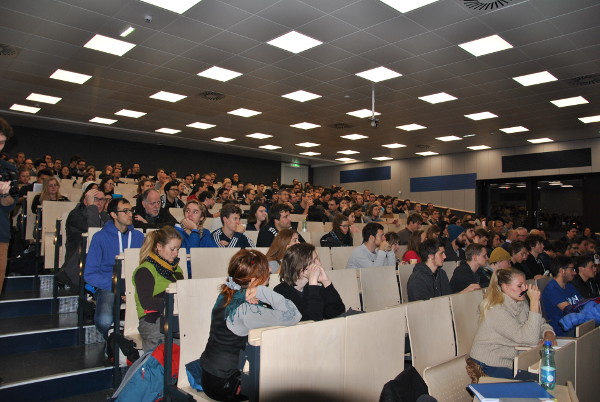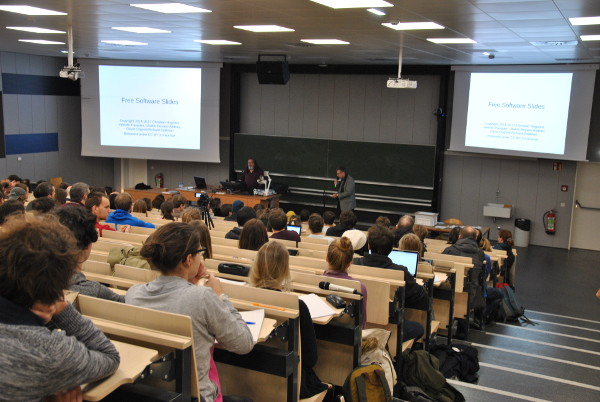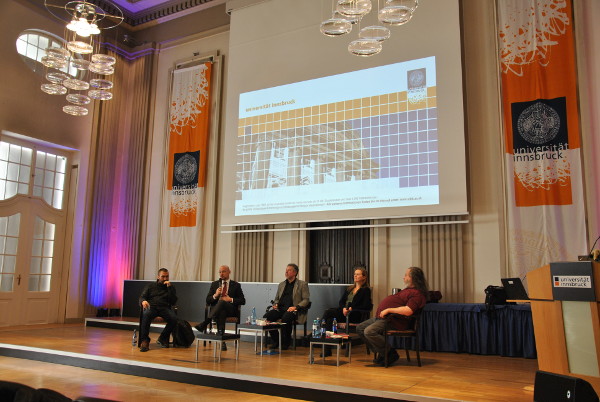November 2017: Photos from Sacramento, Innsbruck
mardi 26 décembre 2017 à 19:59Free Software Foundation president Richard Stallman (RMS) was in Sacramento, California, on November 15th, as a guest of the Child Welfare Digital Services, which is a California-government project whose mission is to “fundamentally change the way state government develops software by leveraging free (libre) software, agile methodologies, and user centered design.” Their further goals are to “research, design, develop and operate a solution that is compatible with the GNU General Public License (GNU GPL), and is thus available to be copied and used as a public good by other government agencies and the public at large.”
RMS spoke to an audience of software developers (from Ruby on Rails, Java, PostgreSQL, and others), state-government IT staff, and business managers.



(Copyright © 2017 Bill Maile. Photos licensed under CC BY 4.0.)
Later in the month, he was in Innsbruck, Austria, for a lecture series on "Challenges to learning and education in the media age" (Herausforderungen für Lernen und Bildung im Medienzeitalter), at the University of Innsbruck. He gave his speech “Education, software freedom, and privacy,”1 to explain the new ways in which our computing and political freedom are being threatened to an audience of 200–300.


(Copyright © 2017 Simon Haller. Photos licensed under CC BY 4.0.)
The next day, on December 1st, still in Innsbruck, during the lecture series “Communicating with robots: Talking robots and social bots in discourse” ("Mit Computern kommunizieren: Gesprächsroboter und Social Bots im Diskurs"), he participated in the panel “Education 4.0? - Between learning bots and users' freedom, is digital inclusion desirable?”1 with Nelson Gonçalves (Portugal), Martin Bauer (Vienna), and Andrea Hemetsberger (UIBK) before an audience of over 150 people.

(Copyright © 2017 Simon Haller. Photos licensed under CC BY 4.0.)
Thank you to everyone who made this trip possible!
Please fill out our contact form, so that we can inform you about future events in and around Sacramento and Innsbruck.
Please see www.fsf.org/events for a full list of all of RMS's confirmed engagements, and contact rms-assist@gnu.org if you'd like him to come speak.
1. The recording will soon be posted on our audio-video archive.↩
Support crucial free software infrastructure today!
mardi 26 décembre 2017 à 17:20The FSF tech team maintains infrastructure for the free software community, and your support helps improve and maintain it. Our use of a free software stack means that our mission to promote computer user freedom is embodied in every bit of our work. Will you power up this key free software infrastructure by supporting the FSF today? Our annual fundraiser ends in a few days, and we need to raise $450,000 by December 31st. Through the end of 2017, all new and renewing Annual Associate Members ($120+) can choose to receive our new Four Freedoms T-shirt! So wear your freedom on your sleeve: become a member or make a donation today.

At the Free Software Foundation (FSF), we run public-facing software to enable development, activism, and information-sharing by thousands of free software users and developers. This includes tools, Web sites, and distribution for the GNU Project, Web sites like h-node, the Free Software Directory, libreplanet.org, and mailing lists for thousands of free software projects at nongnu.org. This infrastructure supports a robust community, with an average of 1 million unique visitors per month to gnu.org, and a half million emails per day via lists.gnu.org and lists.nongnu.org. All that, running on our own servers, using exclusively free software!
Over the last year, we made many hardware and software upgrades, including bringing a new cluster of servers online, which we wrote about in the latest Bulletin. The FSF tech team's biggest goal for the next year is to upgrade all remaining older infrastructure, while refining our practices to improve freedom, privacy, security, and reliability. Here are a few highlights:
-
We are upgrading all our email software. The most visible email software is GNU Mailman, and we are looking forward to using version 3, which has a vastly improved Web interface, including support for posting to lists via the Web.
-
Redesigning www.fsf.org. The most pressing reason is so that it displays better on small screens. The migration of the existing html into modern software and the creation of a new design is a fairly time-consuming task, but we are really excited for the site to expand its reach.
-
Some older configurations and software that we use are decades old, and were developed before version control software was a best practice, so we're moving all of these items into git. We share repositories that others might find useful, or might contribute to, at vcs.fsf.org, and plan to share more over the next year.
-
Since bringing up the new cluster, we are aiming to manage all new virtual machines with Ansible, and to reduce the number of commands we run in servers' local shells. The benefits of this are wide-ranging: systems are easier to change and maintain by being more documented, automated, and uniform. After we finish upgrading older systems, we plan to extend this practice to all existing systems.
We are a small and very dedicated tech team, trying our best to improve the infrastructure that enables the future of free software to thrive. We need your financial support for that work to continue and grow, so please donate now.
Limited time only: get our new Four Freedoms shirt with an FSF Membership
vendredi 22 décembre 2017 à 21:00Spark up a conversation about the free software philosophy with this fun illustration of the four freedoms! Through December 31, 2017, you can get yours as a free premium by joining or renewing with an annual FSF associate membership of $120 or more (this promotion started with the launch of our fall fundraiser on November 14, 2017). Or, wait until spring 2018 to buy one at the GNU Press shop, or the Libreplanet 2018 conference!
This design was created by illustrator Mike Shea and the FSF's Outreach & Communications Coordinator, Dana Morgenstein, and will be printed on heather stone grey T-shirts from Bella + Canvas. It will be available in straight-cut or fitted sizes, and is made in the US in a WRAP-certified facility.

If you want to be the first to hear when the four freedoms shirt is available for sale, join the GNU Press mailing list. As always, if you can't find something in the store but think we should offer it, please add your suggestion to our Ideas page.